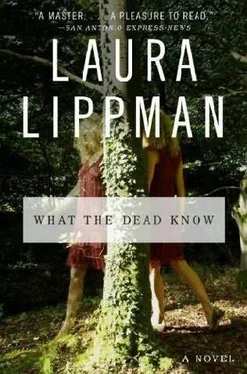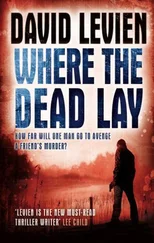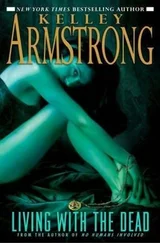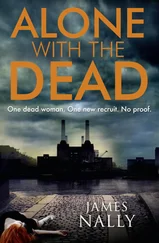“Look, I’m going to go back to my room, brush my teeth and hair, and then we can go, okay? I’ll meet you back here in a bit.”
SHE CROSSED THE small flagstone path that led through the backyard and to the garage, which was set far back on the property, bordering the alley. Stupid to say that thing about Google. What if they went into Kay’s computer, traced her movements? Any competent technician could find her company’s Web site and the e-mail she had sent her boss. Was Kay watching, did she have to go upstairs? After all, there was nothing there that she needed. The police had taken her key ring the night they stopped her. How grateful she’d been at the time that even her key ring couldn’t betray her. It was just a lump of turquoise on a silver bar, something picked up in a thrift shop, an item of no significance. For obvious reasons, she had never been one to personalize her belongings, to embroider her monogram into things, although it had certainly been suggested that she do just that on various tea towels and aprons, back when she was in her teens and “engaged” to Tony Dunham. “Sure, Auntie. I’m just dying to have a fucking hope chest.” She had been slapped for the “fucking,” yet not for the fucking. What a household. What a goddamn messed-up, mixed-up place that had been, behind the gingham curtains and the ruffled petunias in the window boxes.
She wished she had some money or at least a credit card. Oh, if only her wallet hadn’t been missing-stolen by Penelope, she was sure of that much now, the woman was clearly a schemer, incapable of gratitude-and she hadn’t been so confused and disoriented that first night. She could have talked her way out of the traffic violation somehow, even with no license and a car registered to someone else. Although, knowing what she did of Penelope, she wouldn’t be surprised to find out that the license plates had expired or that the car had multiple parking citations stacked up in some municipal computer somewhere.
She glanced back over her shoulder. Kay was still in the kitchen, drinking her coffee by the sink. Shit. She would have to go upstairs after all. Then what?
IT WAS HARD, opening the bathroom window with just one arm to press against the old, warped wood, harder still to squeeze through the tiny opening and drop a full story, but she managed. Adrenaline was a marvelous thing. Brushing the knees of her slacks-Grace’s actually, and she felt bad about that, of all the things she’d done, she felt bad about taking a teenager’s favorite slacks and getting the knees dirty-she got her bearings. The closest busy street was Edmondson, to her right. It led straight to the Beltway, but she couldn’t hitchhike on the Beltway. She should try Route 40, but that ran east-west and she needed to go south. She’d figure it out. She always figured things out, eventually.
She began walking briskly, rubbing her arms. It would be cold when the sun went down, but perhaps she would get lucky, make it home by then. If she could get a lift to the airport and take the train-Did the locals run on Sundays? Amtrak did, and if they didn’t catch her by New Carrollton, she could make it the whole way. Even on a local, she was willing to bet that she could stall a conductor for a few stops, persuade him that she’d lost her ticket, maybe even been mugged, although that was risky, for he would want her to report that to the police. If only she’d gotten on the train Tuesday, the way she was supposed to . She could tell the conductor that she had a fight with…her boyfriend, and he pushed her out of the car, that was it, and she was stranded and needed to get home. She could sell that story. Hell, she’d once seen a homeless woman ride free from Richmond to Washington, even as she chattered that she was going to meet with the president. It’s not as if they put you off in the middle of the tracks, and if she could make Union Station, she had a shot. She’d call a coworker, or even her boss if necessary, maybe risk jumping the turnstiles on the Metro, anything to get home again. It was all she could do not to break into a trot toward the busy street, with cars rushing back and forth. She felt as if she were running toward the real world, a place of motion and confusion where she could once again safely disappear, that she would have to reach top speed to break through the wall between it and this make-believe kingdom where she’d lived the past five days.
But just as she came to the end of the alley, a patrol car surged forward and blocked her path, and that plump, smug detective stepped out.
“I called you on my cell,” Nancy Porter said. “We weren’t sure you would run, but we were curious to see what you would do when we said we wanted you to meet Miriam. Infante’s at the other end of the alley. And, as you know, there was always a uniform out front.”
“I’m just taking a walk,” she said. “Is that against the law?”
“Infante went to see Stan Dunham this afternoon. He learned some interesting things.”
“Stan Dunham’s not capable of telling anyone anything, even if he were so inclined.”
“See, it’s really interesting that you know that, because you managed not to mention his incapacitation yesterday, and I made a point of not sharing it, because I wanted you to think he could contradict you. Yesterday you indicated that you hadn’t had any contact with him for years.”
“I haven’t.”
The detective opened the rear door. It was a proper police car, with a wire screen between the front and back seats. “I don’t want to cuff you, because of your arm and because there’s no charge on you-yet. But this is going to be your last chance to tell us what really happened to the Bethany girls, Ruth. Assuming you know.”
“I haven’t been Ruth for years,” she said, getting into the car. “Of all my names, I hated Ruth the most. I hated being Ruth the most.”
“Well, you’re giving us your current name today, or you’re spending the night in the Women’s Detention Center. We’ve indulged you for five days, but time’s up. You’re going to tell us who you are, and you’re going to tell us what you know about the Dunham family and the Bethany girls.”
If she had to put a name to what she was feeling, it might have been relief, the knowledge that this was going to end once and for all. Then again, it might have been absolute dread.
“We could show her to you, on the closed-circuit video,” Infante offered Miriam. “Or walk her by you in the hall, let you get a look at her.”
“There’s no way she’s Heather?”
“Not if she’s Ruth Leibig, and she’s all but admitted that was her name. Ruth Leibig graduated from high school in York, Pennsylvania, in 1979 and married the Dunhams’ son the same year. Heather would have been sixteen then. The marriage would have been legal, especially with the Dunhams as witnesses. But how likely is it that Heather graduated high school two years early?”
“I was the one who picked up on that,” Willoughby put in, but Infante didn’t begrudge him that little bit of self-importance. Eventually Infante would have noticed it, too, the date discrepancy. But such facts as the Bethany girls’ DOBs were burned into Willoughby ’s brain, much as the old man had tried to deny it.
“No, Heather was smart, but not so smart that she could skip two grades,” Miriam admitted. “Not even in a parochial school in the Pennsylvania boondocks.”
Infante had gone to Catholic school and thought it pretty rigorous, but he wasn’t going to contradict Miriam on anything just now.
“So what did happen to my daughters?” Miriam asked. “Where are they? What does any of this have to do with Stan Dunham?”
“Our supposition is that he did abduct and kill your girls and that his son’s wife, Ruth, somehow came to be privy to the details,” Infante said. “We’re not sure why she’s safeguarding her current identity, but chances are she’s wanted on a warrant for something else. Or she knows for sure that Penelope Jackson set the fire that killed Tony Dunham, and she’s trying to protect her, although she keeps insisting she has no relationship with the Jackson woman. When we ask about the car, she takes the Fifth. When we ask her anything, she takes the Fifth.”
Читать дальше












